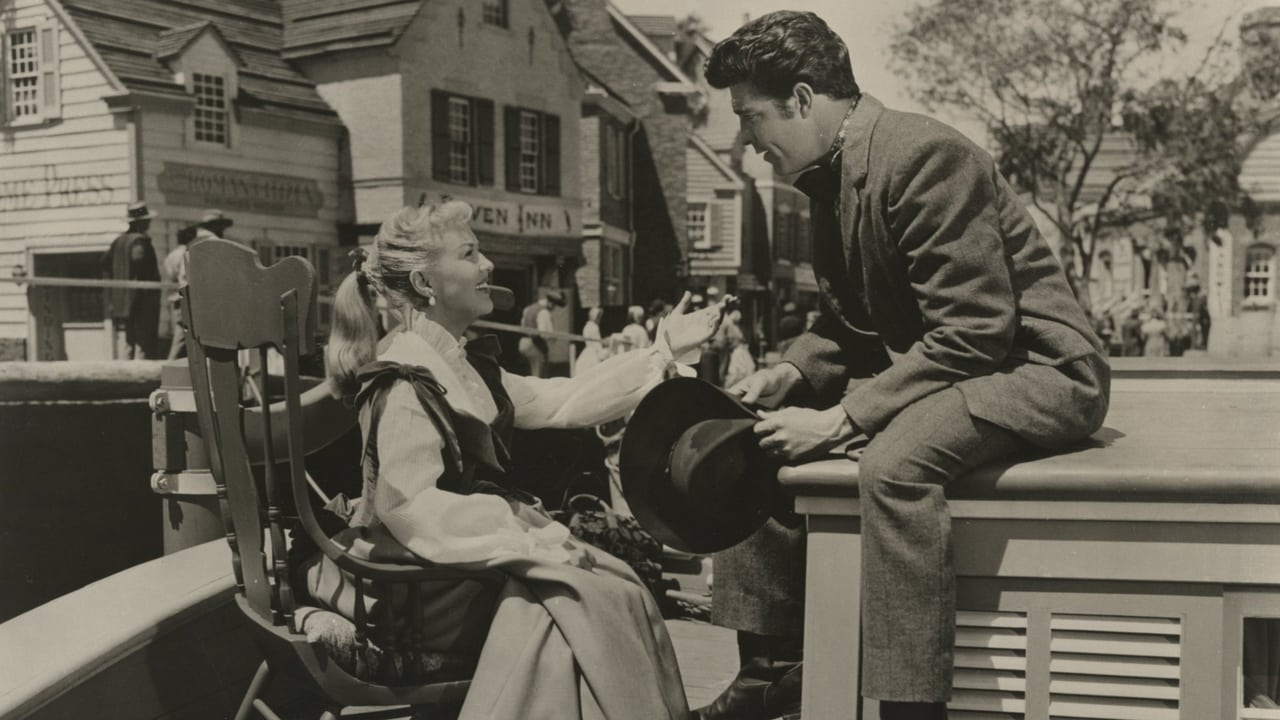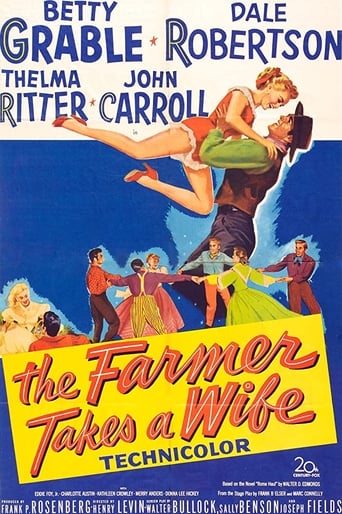Cleveronix
A different way of telling a story
ChanFamous
I wanted to like it more than I actually did... But much of the humor totally escaped me and I walked out only mildly impressed.
Gurlyndrobb
While it doesn't offer any answers, it both thrills and makes you think.
Kaydan Christian
A terrific literary drama and character piece that shows how the process of creating art can be seen differently by those doing it and those looking at it from the outside.
pokey-46546
Typical 1950's Hollywood production. Costumes are not period, zippers, high heeled pumps and pony tails were not part of the 1850's. The men wear dinner jackets with bow ties and everyone's outfit is sparkling clean and starched, despite the fact that they have been working all day plowing, washing and cleaning. Penciled in eyebrows, eyeliner and lipstick a hundred years too early. Betty Grable still looks like a a pin up girl, and Dale Robertson has a pompadour hair style, also why are they using southern accents in Rome NY? This movie is cute but not Betty Grable's best picture by far. Lovely 1950's period piece in long skirts.
moonspinner55
Agreeable 20th Century-Fox musical, a remake of their 1935 Janet Gaynor-Henry Fonda comedy-romance, based on the novel and play "Rome Haul", is uncertainly directed, full of static staging, and embarrassed by at least one terrible dance number--but it does have Betty Grable, full of her usual sass and vigor (which this vehicle definitely needs). On the Erie Canal in 1850, a young lovely and her fiancé/business partner run a barge hauling supplies (she cooks, he drinks); she hires a horse-driver to pull the barge, a low-keyed farmer with a sweetheart in Chicago, but when her fiancé is thrown in jail for fighting with the incoming railroad folk, the girl goes into partnership with the handsome newcomer, sparking romance. Director Henry Levin doesn't seem to know anything about staging a musical number on the screen; though the mediocre songs by Harold Arlen and Dorothy Fields are clearly no help to him, Levin hasn't paced the narrative with the energy needed for a musical, and the introductions to each song are creaky with hesitation. "We're in Business", featuring Gwen Verdon (who pops in without an introduction), is the worst of the lot, while the reprise of "Today I Love Everybody" includes a brief vocal by Thelma Ritter that proves the actress can't do everything. Grable and quiet, polite Dale Robertson aren't an exciting match, but his gentle tone cools down her brashness. There's a streak of early feminism in Grable's character when she flatly refuses to become a farmer's wife (without her feelings on the matter even being considered!), which is then abandoned in the face of true love, however she and Robertson look good together. The color is gloppy, and the finale--where Levin apparently chose to move the material back to its stage roots--is perplexing, yet the movie is upbeat and pleasurable despite its faults. **1/2 from ****
MartinHafer
The one thing you'll no doubt notice when this film begins is that Betty is clearly older. She's 37 and playing a part designed for a teenager or perhaps a woman of 20...plus she simply looks older than 37. She also apparently had far less clout by 1953, as she was cast along with Dale Robertson--not exactly a household name. RObertson wasn't bad in the film, mind you...but he was a big comedown from folks like Don Ameche or Victor Mature in the 30s or 40s. Studio veterans John Carroll and Thelma Ritter are on hand to lend support. This loss in popularity also might help to explain why the once big star was forced to do a remake of a completely unremarkable film. The 1935 version was only fair and here almost two decades later it's essentially the same film but with music and Technicolor. This remake is certainly no better due to the miscasting of Grable, a few very unremarkable songs and a plot that just seemed to drag. Not a bad film but one that clearly showed that Grable's days as a star were nearly passed. Watch it if you'd like but it's only a time- passer and nothing more.
ccmiller1492
"The Farmer Takes a Wife" is so disappointing that it could serve as an example of "the last gasp of the Hollywood musical." It's hard to believe that the marvelous "Seven Brides for Seven Brothers" came out the following year. To start with, none of the songs are memorable, and the production numbers are so stylized and overstuffed with flounces, ruffles and ribbons that they are effectively deadened. Grable herself looks slightly overblown in this context and John Carroll who has a very pleasing voice and good presence, is not allowed to sing at all other than humming a few bars. Dale Robertson, who is not a singer and probably had his singing dubbed, is given one of the best songs to sing while taking a bath in a rain barrel...and is repeatedly shown apparently scrubbing at his crotch while performing the song! Viewers are well advised to skip this one, which is for extreme Grable and/or Carroll fans only. Even they will have a hard time tolerating it.

